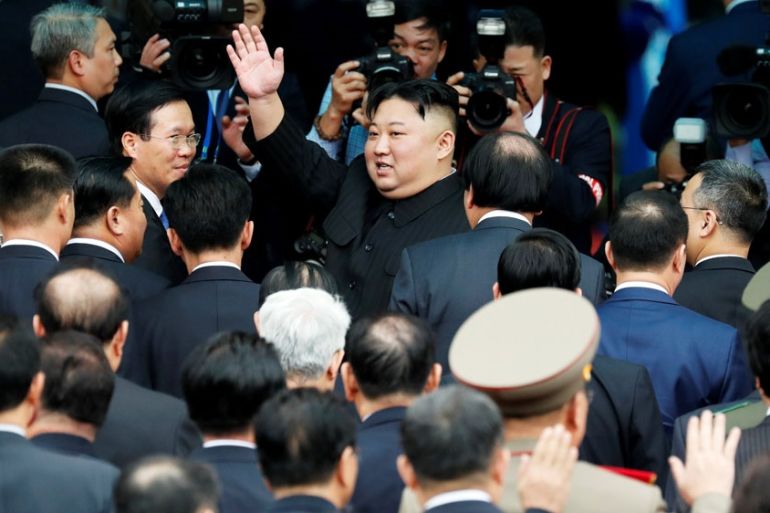Is Kim Jong Un ‘supreme representative of all the Korean people’?
North Korean leader awarded himself a new title recently. But the view from Seoul is not that encouraging

Seoul, South Korea – Kim Jong Un’s new title which he conferred upon himself – the Supreme Representative of all the Korean People – is said to solidify the North Korean leader’s grip on power but is also likely to cause aggravation in Seoul.
North Korean state media, the Korean Central News Agency, began using the new title on Friday after Kim emerged from one of North Korea’s largest political reshuffles in recent history with increased powers.
Keep reading
list of 4 itemsNorth Korea says Kim Jong Un oversaw test of new hypersonic weapon
North Korea claims progress in development of hypersonic missile
North Korea’s Kim oversees ‘super-large’ rocket launcher drills
But while some analysts in South Korea are debating what the new title means, some believe it is in line with Pyongyang’s ultimate goal of reunification which it has stated openly on numerous occasions.
“They’ve been talking about the issue of ‘minjok’ for some time now,” James Kim, of the security think-tank Asan Institute in Seoul, told Al Jazeera.
Minjok is the Korean term for the shared bloodline between Korean people and is often used to spark nationalist fervour and rally public support.
“It’s not out of the ordinary and North Korea has always stuck to that kind of rhetoric.”
The idea of reunification is built into North Korea’s political system, with the ruling Worker’s Party leading a coalition called the Democratic Front for the Reunification of the Fatherland, otherwise known as the Fatherland Front.
The South Korean government has yet to comment on Kim’s new title but reactions in Seoul have been mixed, with many passing the comment off as just another boisterous claim by the North Korean leadership.
“Grand overstatements are par for the course in DPRK politics and media,” said Lonnie Edge, assistant professor at the Hankuk University of Foreign Studies in Seoul.
Many in Seoul feel the same.
“They’re always saying outrageous things. I don’t take it seriously,” said Kim Mee-young, a nail artist and hip-hop dancer in Seoul.
|
|
Others believe Kim had no right to claim to represent South Koreans.
“We already have a president. Most South Korean people wouldn’t approve of that [Kim’s title],” said Lee Gi-yoon a 27-year-old police officer from Busan, South Korea.
But not everyone in South Korea is sceptical of Kim. When rumours spread of Kim’s possible visit to Seoul last December, a poll by Realmeter found 61 percent of South Koreans willing to welcome the North Korean leader.
Kim is not the only leader stoking hopes for a reunited Korean Peninsula.
President Moon Jae-in, whose parents fled North Korea during the 1950-53 Korean War, has led an ambitious charge towards improving ties with Pyongyang.
‘Peace, prosperity and reunification’
Last week, Moon reaffirmed his reunification goals after his return from Washington where he held talks with President Donald Trump in the United States to discuss progress on denuclearisation talks with North Korea following the failed Vietnam summit in February.
“The fervent desire of the Korean people is to see the journey towards ultimate peace, prosperity and reunification completed,” Moon said in a statement to senior secretaries.
The idea of reunification, however, may be losing support among young South Koreans.
A survey done in 2017 by the Korea Institute for National Unification found that 71 percent of South Koreans in their 20s are against reunification. Support has plummeted across the population to 57.8 percent, down from 69.3 percent in 2014.
After nearly 70 years of separation, the economic and cultural differences have widened between the world’s last hermit kingdom and the technologically-advanced society of South Korea.
South Korea currently has a gross domestic product (GDP) of $1.5 trillion compared with North Korea’s $12.38bn.
Although relations have improved in recent months, a stream of hostile rhetoric from North Korea in the past has also kept many young people from seeing the benefits of reunification.
“I don’t even hope for reunification any more, I think a lot of young people feel the same,” said 28-year-old Yoon Sora, who works at an airport in South Korea.
“North Korea has broken our trust a few times. So we don’t know when they’ll betray us again.”
Some also believe Moon may be blinded by his hopes for reunification.
But shifting public opinion has not stopped Moon from putting great effort into establishing peace on the peninsula, as his recent trip to Washington has shown.
“Peace on the Korean Peninsula is a matter of survival for us. This is a matter that is inseparable from not only the lives and safety of the Korean people, but also the economy,” Moon said in a statement after his trip.
He also told senior officials that an inter-Korean summit was the next step in the dialogue with North Korea, adding that Trump also “recognised the need” for that summit.
With the next inter-Korean summit likely to take place in Seoul, public opinion on Kim and reactions to his boisterous claims will be put to the test.
|
|